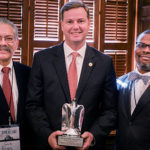HUNTSVILLE—When Johnny Flowers Jr. told his story, one could almost see his mind taking in the world around him, trying to make sense of it all and gain his bearings, like a newborn child.
|
A prison ministry volunteer (left) walks with a recently released offender from the Walls Unit in Huntsville as he heads to catch a bus a few blocks away. (PHOTOS/Kaitlin Warrington/Texas Baptist Communications)
|
After six prison stints and more than 20 years behind bars, Flowers had been a free man nine days.
In many ways, he still was adjusting to life outside the walls. He slipped in and out of first person when speaking about people in prison. He just received his driver’s license and hoped to open a bank account.
Life, he said, looks different than before—not because of the societal changes that took place during his incarceration, but because he views life differently.
Dramatic conversion
For years, family, friends and prison ministry volunteers encouraged Flowers to change his life by turning away from alcohol—the source of many of his problems—and developing a relationship with God. But pleas fell on deaf ears.
“I didn’t know what love was,” he said. “I didn’t even love myself. But I knew there was something powerful about the
Spirit, about God. But I didn’t know how to get it.”
 Sign up for our weekly edition and get all our headlines in your inbox on ThursdaysBill Kleibler with Restorative Justice Network prays with former prisoners just after they are released from the Walls Unit.
|
During Flowers’ sixth time in prison, he got into a phone argument when his stepfather pushed him to change his ways. Flowers became frustrated and hung up on him. The next day, his stepfather died.
Flustered, Flowers began searching for meaning to his life. He started reading a Bible at night.
After years of struggling in secret, he gave his life to Christ, he said. He asked God to forgive his sins and pledged to follow Jesus. He knew immediately God was there.
“It was weird. I felt different,” he said. “I started telling people I loved them.”
He devoured every piece of Christian literature he could find. He regularly attended chapel services and participated in Bible studies. David Valentine, now pastor of Covenant Fellowship in Huntsville, and other volunteers began discipling him.
He wanted to give himself completely to God but felt trapped in the pain others had inflicted on him, he said. One night, he finally let go of that, writing down every person and everything that had hurt him. When he was finished, he crumpled the paper and threw it in the toilet.

Texas has 150,000 people in prison, 75,000 people in county jails, and 70,000 a year enter the prison system.
|
“Everything that hurt me, I wrote it down and flushed it away,” he said. “That little voice said: ‘Now I can use you. You’re pure.’”
One of many
Flowers said many of the 150,000 incarcerated people throughout the state feel like he did. They want their lives to change but do not know how to change. They are afraid to take a chance on God, fearing what others will think of them.
“I speak not only for myself, but for my other brothers that are behind the walls still lost. We need people to help us take that step,” he said.
“A lot of us in there are afraid. We’ve never been told what love truly is. Love is an action word. But we never have experienced it. The average guy in there is searching for love, but they don’t know how to find it. They don’t know how to talk. They’re afraid to talk because they’ve always been told: ‘Be quiet, you’ll never amount to anything. You’re no good.’”

The clock at the Walls Unit in Huntsville is ticking for inmates once they are released and given a $50 check, a bus voucher and an onion sack with the few belongings they had with them in prison. Ex-offenders have 24 hours to get home and report to a parole officer in order to stay in good standing with the Texas Department of Criminal Justice. (PHOTO/Kaitlin Warrington/ Texas Baptist Communications)
|
Valentine agreed. His congregation ministers to prison staff and offenders, seeking to share the hope of Christ how-ever possible. Through their ministry, they have seen Delvin Mouton, an imprisoned Dallas gang leader, turn his life over to Christ. Although his gang is “blood in, blood out”—meaning a person has to shed another person’s blood to become part of the gang and endure a beating to get out—he exited the gang without harm. He has since led another gang member to Christ and helped him exit the gang unharmed. Recently, he felt called to ministry.
“I am stepping into the life God has for me right here in prison,” Mouton wrote. “I have come full circle with what God was calling me to do at the age of 14.”
The criminal justice system directly affects about one-third of the state, Valentine said. Beyond the 150,000 people in prison, 75,000 people are in county jails, and 70,000 a year enter the prison system. About 450,000 people are on probation. Statistically, each person in the criminal justice system has five family members.
The Baptist General Convention of Texas recently retooled its restorative justice ministry efforts, seeking a more collaborative approach with the Texas Baptist Men Restorative Justice Committee by bringing together leaders such as Valentine, the Restorative Justice Ministry Network in Huntsville and Texas Baptist Men’s Inmate Discipler Fellowship.
The effort—funded by the Texas Baptist Cooperative Program and gifts to the Mary Hill Davis Offering for Texas Missions—will help groups work together and use funds as effectively as possible.
“What we’re trying to do is turn these guys into better husbands, better men of God,” Valentine said of his church.
“Eventually, some of these men will be called to be pastors. What we’re trying to do is a church-planting movement of raising up men who can start Bible study groups with ex-offenders and sex-offenders, because the truth is it’s going to be real hard to get them in our established chur-ches,” he said. “So, we’re going to have to start new churches to reach this unreached people group.”
An open door
Bill Lewis, warden of the Walls Unit, believes faith-based programs make a significant difference. He sees it each day. Chaplain Larry Hart recruits and trains volunteers to minister to inmates. He also counsels inmates when they enter the institution and when they are dealing with issues such as family deaths.
Faith-based volunteers are beacons of hope for offenders, Lewis said. They provide Bible studies, marriage classes, literacy classes and other opportunities designed to improve inmates’ lives.
“If you can have a positive influence in the middle of your offender population, bringing positive virtues on them, it’s going to give them some incentive to act right and behave correctly,” Lewis said.
Flowers calls himself a testimony to the effectiveness of faith-based volunteers and chaplains. Because of their commitment to help him, his life changed.
“If it weren’t for David and the guys coming in and studying and working with us and the chaplains working with us, it wouldn’t have been possible,” he said, standing outside the Walls Unit. “Over 20 years of my life were spent on the other side of these walls. If they take the chaplaincy from these people, it’s going to be chaos. The chaplains, they bring these people in to help us.”
When Flowers was released, volunteers with Restorative Justice Ministries Network and Covenant Fellowship were waiting on him. They’re helping him find a place to live and food to eat. Valentine has introduced Flowers to several Christian business leaders, seeking to help him find a job.
It’s help Flowers appreciates. In many ways, prison became a comfort to him—a place where he had a role, he noted. Now, many people see him as an ex-convict who can’t be trusted, a stigma he struggles to deal with each day.
“When I was first released, I felt safer in prison,” he said. “When I got released, all these people look at you different.”
Flowers knows he’s made mistakes in the past, but he’s seeking to follow God as he restarts his life. He hopes other former inmates attempting the same journey he has begun find Christian helpers like the ones he found at Covenant Fellowship.
“I wish the churches would give us an opportunity to show what we really are,” he said. “Don’t judge us by the paper that we have on our back. Judge us by what we’re doing now—the present.
“If you judge us by the paper that’s on our back, you’ll never like us, because we were lost sinners. Judge us for what we are now. We’re new crea-tures now. That’s why I wish the church would just give us the opportunity. Invite us into the church. Come visit us.”














We seek to connect God’s story and God’s people around the world. To learn more about God’s story, click here.
Send comments and feedback to Eric Black, our editor. For comments to be published, please specify “letter to the editor.” Maximum length for publication is 300 words.